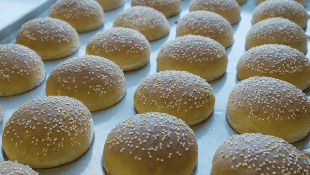Premium Soft Buns and Bread: Industry Trends by AMF

How can bakeries adapt to changing consumer demands?
Following the COVID-19 pandemic, the bread and baked goods sector has observed an ongoing premiumization. This is due to the trend for consumers to start ‘trading up’ on everyday goods: Since they couldn’t go out to restaurants, people began treating themselves to more restaurant-quality products at home. And the trend is persisting even now that restrictions have been lifted. One category that has been particularly impacted by this premiumization is soft bread and buns, especially premium ‘luxury buns’, as well as brioche buns and rolls. So, what forms does this trend take? And how are large-scale bakery operations meeting these demands for upscale quality while maintaining production efficiency?
Upscale quick-serve restaurant (QSR) buns
In what may seem like an unexpected development, bun premiumization is becoming particularly noticeable in the QSR segment. Traditional sesame-seed and brioche buns are a QSR menu staple, but these formerly simple products are currently experiencing a renaissance. Fast-food operators such as McDonald’s and Subway are, for instance, incorporating seasonal bread varieties into limited-time menu offerings to create special burgers or sandwiches. This includes a shift toward more ‘artisan-style’ features, such as specialist grains or a ‘stone-baked’ effect. On an industrial scale, these effects can be achieved with, for example, a new kind of baking tray or by optimizing ovens to enhance the bun’s appearance. Since customers are becoming more used to such high-quality offerings, we can expect this kind of premiumization to continue across the sector.
Eating cleaner, baking cleaner
Alongside the trend for more artisan-style products is the growing ‘clean-label’ movement, which refers to products with simple, wholesome ingredients. This trend ties in with the healthier habits that many people have picked up during the pandemic. More and more consumers – increasingly conscious of the health implications of their diets – are reducing their sugar and fat intake. It is a fast-growing trend, especially among younger generations, who are looking for more authentic, healthier products. Brands that can successfully meet this need with products that are both ‘clean-label’ and delicious will be well on the way to building long-lasting customer retention.
Increasingly, food reformulation is also being used to achieve healthier baked goods. The aim is to limit certain potentially harmful substances in the diet, such as sugars, saturated fat, trans fat, salt, and sodium. The excessive consumption of these substances has been associated with negative health effects, including obesity, diabetes, coronary heart disease (CHD), and strokes. However, these substances have specific technological roles in foods, in addition to providing flavor, improving texture, and affecting microbial growth. Therefore, food reformulation must consider all these chemical roles to create products that are attractive to consumers. For instance, naturally sourced solutions are required to ensure food safety, shelf-life stability, and food color protection. Natural substitutions may include ingredients such as vinegar, vitamin C, cultured starches, spices, and plant extracts.
Another part of this ‘clean-label’ trend is the ever-popular ‘gluten-free’ movement. More and more bakeries are catering to gluten-free diets with an ever-growing range of gluten-free favorites. Just as ‘brioche improvers’ are being used as substitutes for eggs and butter, gluten-replacement ingredients are taking on the structural role of gluten in more and more products.
Plant-based perfection
For those who do not eat animal-based products – for dietary or lifestyle reasons – the soft bread and buns segment has much to offer. Many QSR outlets, for instance, are now offering at least one plant-based option on their menus, to cater to the growing uptake of plant-based diets. Back in the supermarket, major brands are pairing up with future-food companies to deliver their own plant-based offerings, using their skills and experience to help them succeed in this new category. These offerings can often be complicated to scale up to industrial production, but bakers are finding novel ways to make them work.
Brioche buns are an example of a category that has traditionally been difficult to make plant-based, due to the requirement for eggs and butter in their production. However, there are now several vegan options available. For example, within the category of ‘dough improvers’ (additives that improve the taste and texture of bread), there now exist vegan ‘brioche improvers’ that mimic the signature taste and texture that eggs and butter would otherwise bring.
All in all, although greener and plant-based ingredients do require tweaks to the production process, the increasing consumer demand in these markets means they are certainly worth investigating. At AMF Bakery Systems, our advanced machine portfolio can help you to stay ahead of shifting consumer preferences. From intuitive, data-driven mixers that keep your specialty dough at the optimal temperature, to topping machines and strewers that give your buns that irresistible seeded crust, our top-quality, tailored solutions help you inspire your consumers and stand out from the competition.
If you’re interested in finding out more about premiumizing your bread and bun products, read this article on the AMF Bakery Systems range and how we can help you optimize your premium soft bread and roll production. Book a consultation with Lex Van Houten sales@amfbakery.com.